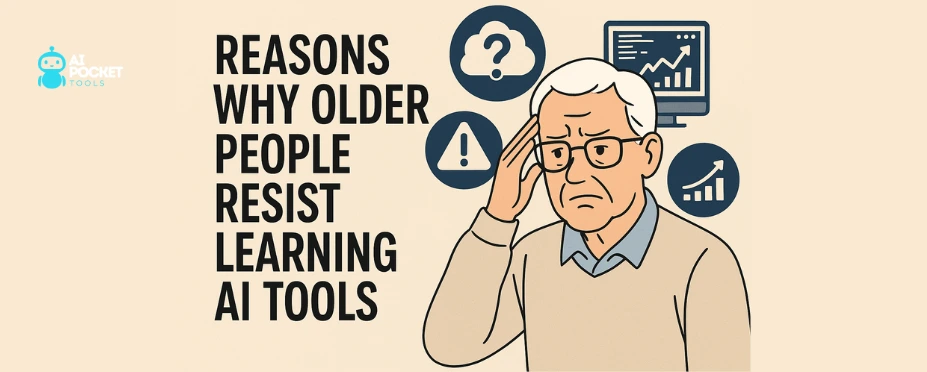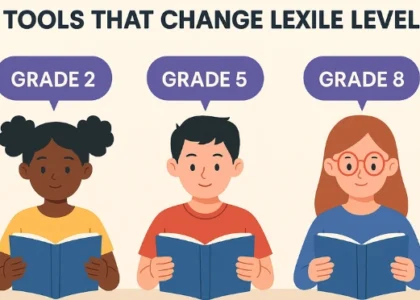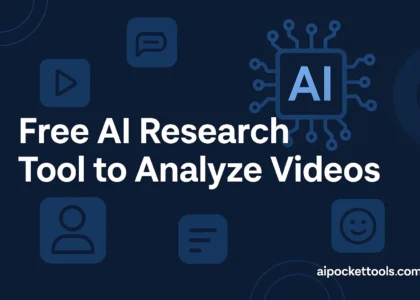As artificial intelligence becomes part of daily life, a clear gap is emerging in who uses it and who avoids it. One major concern is the reasons why older people resist learning AI tools. Many seniors feel overwhelmed by complex technology, unsure of its value, or fearful of making mistakes. Barriers such as limited digital literacy, physical challenges, and a lack of confidence all play a role. At AI Pocket Tools, we explore accessible AI solutions and learning resources that can help make smart tools more approachable for everyone—including older adults.
Top Reasons Older Adults Avoid Learning AI Tools
Older adults often avoid AI tools due to fear of technology, confusing interfaces, and a lack of confidence. Many feel they are “too old to learn,” while others struggle with memory, vision, or hand movement. Without proper guidance or training, AI tools can seem overwhelming. These reasons why older people resist learning AI tools are rooted in real challenges—but with the right support, they can be overcome, helping seniors feel more comfortable with smart technology.
Real-Life Stories – What Seniors Say About AI
Many older adults express frustration or fear when using AI tools. Some say, “It’s too fast for me,” while others worry, “What if I press the wrong button?” These real-life stories highlight the emotional side of tech resistance. Understanding the reasons why older people resist learning AI tools isn’t just about features—it’s about feelings. Listening to seniors helps us create AI that feels safe, helpful, and truly made for them.
Barrier Breakdown with Fixes
Seniors face many barriers with AI—like memory issues, poor eyesight, and fear of failure. But each problem has a solution. For example, large-text displays and voice commands can help with vision or mobility. Step-by-step tutorials build confidence. Family support also makes a big difference. Tackling these reasons why older people resist learning AI tools with easy fixes can open the door to a more inclusive and helpful digital world for older adults.
| Barrier | Simple Fix |
|---|---|
| Fear of AI tools | Step-by-step guided tutorials |
| Poor vision | Larger fonts, voice support |
| Low confidence | Family or peer-assisted learning |
| Confusing interfaces | Simplified UI with clear icons |
| No perceived benefit | Real-life examples showing value |
The Role of Family & Society in AI Adoption
Family members play a big role in helping older adults learn AI tools. A little patience and one-on-one help can reduce fear and confusion. Community centers and tech workshops also support learning. When society treats seniors as capable learners, confidence grows. Many reasons why older people resist learning AI tools can be eased with kindness, time, and encouragement from loved ones and local groups working together.
Designing AI for Seniors – What Developers Get Wrong
Many AI tools are not designed with seniors in mind. Tiny buttons, confusing layouts, and fast responses can feel overwhelming. Developers often forget that older adults need simple, clear instructions. By improving accessibility, using voice features, and reducing clutter, AI can become user-friendly. Solving the reasons why older people resist learning AI tools starts with better design—making technology easier, not harder, for everyone to use.
How Governments & NGOs Can Help
Governments and NGOs can support older adults by funding AI training programs, offering free tech workshops, and distributing senior-friendly devices. Public libraries and community centers can become safe spaces for digital learning. With the right support, many reasons why older people resist learning AI tools can be removed. When policy and outreach meet real needs, seniors feel more confident, connected, and included in the fast-moving world of technology.
Top AI Tools That Are Already Helping Older Adults
Some AI tools are already making life easier for seniors. Voice assistants like Alexa help with reminders. Health apps track medication and steps. AI chatbots provide simple answers to daily questions. These tools are designed to be easy and useful. By showing real examples, we can reduce the reasons why older people resist learning AI tools and encourage more seniors to try them with confidence and curiosity.
Future Outlook – A Senior-Friendly AI World
The future of AI can be bright for older adults. As more companies focus on age-friendly technology tools, seniors will find it easier to learn and use AI. With better design, strong support, and growing awareness, the reasons why older people resist learning AI tools may fade away. A world where seniors feel safe, confident, and included in smart technology is not just possible—it’s necessary for true digital equality.
Final Thoughts on Why Older People Resist Learning AI Tools
Understanding the reasons why older people resist learning AI tools is the first step toward change. With empathy, better design, and strong community support, we can break down fear and confusion. Seniors deserve access to smart, helpful technology just like everyone else. Let’s create a world where learning AI is simple, not stressful—where older adults feel supported, not left behind. Small steps today can lead to big confidence tomorrow.
FAQ: Reasons Why Older People Resist Learning AI Tools
Why do older people resist learning AI tools?
Older adults often resist learning AI tools due to fear of technology, confusing interfaces, physical challenges like poor vision or mobility, and a lack of confidence. Many also feel AI doesn’t apply to their lifestyle.
How can we help seniors overcome their fear of AI?
Start with simple, real-life use cases. Use large fonts, voice commands, and clear instructions. Family support and step-by-step tutorials can also reduce anxiety and build confidence.
What are the best AI tools for seniors?
Voice assistants like Alexa or Google Assistant, medication reminder apps, and AI chatbots for customer service are great starting points. These tools are user-friendly and helpful in daily tasks.
Is it too late for older adults to learn AI tools?
Not at all. With the right support and accessible design, older adults can learn and benefit from AI tools just like anyone else. Age should never be a barrier to digital literacy.
Why is AI adoption slower among older adults compared to younger people?
The digital generation gap, cognitive changes, physical limitations, and lack of exposure to technology from an early age all contribute to slower adoption rates among seniors.





